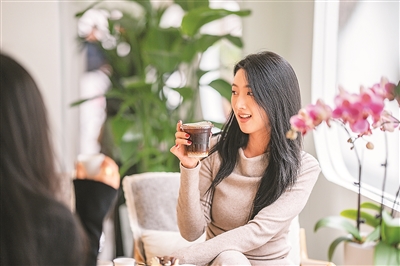




- BRNN
- BRI News
- BRNN News
- Database
Official Documents Polices and Regulations
Inter-government Documents International Cooperation BRI Countries
Business Guide Economic Data BRI Data
Trade
Investment Projects Latest projects
Cases - Content Pool
Innovative products designed to relieve anxiety and provide emotional companionship have gained significant traction in the Chinese market. Emotional consumption has emerged as a hot trend in China.
According to a report on the social mentality of Chinese young internet users in 2024 recently released by the Fudan Development Institute, young people consider not only a product's value-for-money but also the emotional value it delivers when making purchasing decisions.

A stallholder sells dolls of cartoon characters in Luqiao district, Taizhou, east China's Zhejiang Province. (Photo/Jiang Youqing)
The emergence of emotional consumption is a result of evolving consumer demands, said Hong Yong, an associate researcher at the e-commerce research institute of the Chinese Academy of International Trade and Economic Cooperation under the Ministry of Commerce.
With growing affluence, people gradually shift from meeting basic living needs to pursuing personalized, quality-oriented, and diversified demands, Hong noted.
Chinese e-commerce giant Taobao's "top 10 products of 2024" reflects this shift, with more than half of the items related to emotional value.
"People are increasingly concerned about mental health and gravitate toward emotional consumption, especially 'self-pleasing consumption' that bring joy," said Guan Jian, a professor from the School of Sociology at Nankai University.
Consumers now value the emotional connection and resonance a product offers more than its practicality, Guan added.
This growing demand for emotional value has fueled the booming "guzi economy." The word "guzi," a homonym for the English word "goods," refers to badges, acrylic figure stands, cards and other merchandise featuring ACG (animation, comic and game) culture elements.

A woman poses for photos in a cafe in Simao district, Pu'er, southwest China's Yunnan Province. (Xinhua/Hu Chao)
According to data analysis provider iiMedia Research, the market size of China's "guzi economy" reached 168.9 billion yuan ($22.98 billion) in 2024, and is projected to hit 308.9 billion yuan by 2029.
"The moment I buy 'guzi' products, I feel as happy as when I receive a salary notification," said Li Jie, a post-95 programmer, showing off a game figure stand he just got from a mystery box. "Placing 'guzi' products at my workstation gives me a reassuring sense of companionship," Li added.
Within communities sharing common interests, mystery boxes and figurines are not merely toys but catalysts for consumers' social interaction.
Some consumers derive emotional value from buying virtual goods. Li Cheng, a Taobao store owner selling virtual "emotional products," said purchasing virtual goods is like making a wish upon a shooting star—it brings emotional comfort. His store offers various virtual products for people to make wishes, covering academics, love, career, and other aspects, embodying consumers' positive expectations for life in a humorous way.
Many virtual services also provide emotional solace. "Young people seek emotional value, including stress relief, relaxation, emotional healing, passion, sincerity and companionship. Virtual services offer more options and enrich their experiences," said Zeng Runxi, deputy dean of the School of Journalism & Communication at Chongqing University.
Artificial intelligence (AI) technology has opened new avenues for emotional consumption. XiaoZhi AI, an AI chatbot launched by a company based in Shenzhen, south China's Guangdong Province, exemplifies this trend.
"XiaoZhi's responses are objective and calm, yet heart-warming," said Wang Zhichao, a 27-year-old tech vlogger who often uses the AI chatbot during his livestreams to help answer difficult questions from his followers.
"The AI chatbot can detect anxiety through voice analysis and proactively suggest playing music or meditation. It provides personalized interactive experiences and remembers users' emotional preferences and habits," said Lin Zhongqiao, the company's product manager.
Currently, the company is in talks with toy manufacturers to integrate XiaoZhi's features into toys and dolls, making virtual companionship more appealing.
In recent years, AI companion products like "AI psychological companions" and "AI emotional counselors" have gained popularity for their emotional value.
Liu Xin, a young entrepreneur in Wuhan, central China's Hubei Province, regularly chats with her AI companion "Lele."
"I named it 'Lele,' hoping that it would ease my entrepreneurial pressure and bring joy," Liu said, adding that it tirelessly answers her questions, offers encouragement, and communicates with humor—something that can be hard to expect from human friends.
Zhang Ya, an associate professor from the School of Psychology and Cognitive Science at East China Normal University, observed that young people tend to prefer "light relationships," such as dining companions, card game partners, or travel buddies—needs that AI emotional companionship can fulfill.
Industry experts pointed out that AI companions may pose risks, including privacy breaches, content safety issues, consumption traps, and emotional dependency.
Shen Yang, a professor at Tsinghua University, recommended establishing content standards and review mechanisms for emotional consumption products, promoting algorithmic transparency, and reducing risks of user manipulation or data misuse.

Tel:86-10-65363107, 86-10-65368220, 86-10-65363106